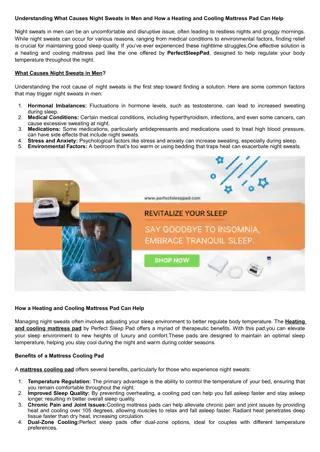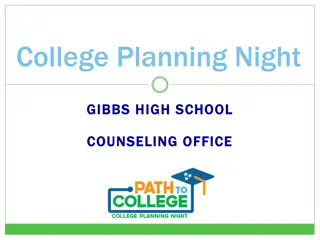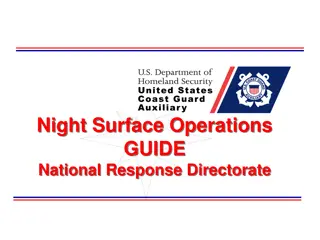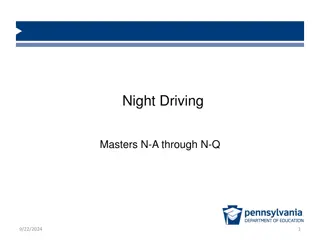
Understanding College Readiness Skills
Explore the concept of college readiness, what it means for students, and how parents can support their children in developing the necessary skills for success in higher education. Discover the importance of math skills, English proficiency, and career readiness for long-term success.
Download Presentation

Please find below an Image/Link to download the presentation.
The content on the website is provided AS IS for your information and personal use only. It may not be sold, licensed, or shared on other websites without obtaining consent from the author. If you encounter any issues during the download, it is possible that the publisher has removed the file from their server.
You are allowed to download the files provided on this website for personal or commercial use, subject to the condition that they are used lawfully. All files are the property of their respective owners.
The content on the website is provided AS IS for your information and personal use only. It may not be sold, licensed, or shared on other websites without obtaining consent from the author.
E N D
Presentation Transcript
Activity: What is college readiness? At your table, discuss: What does college-readiness look like? When is a student is ready for college? What do children need to learn to be ready for college? How can parents help? 2
So? What does it mean? EngageNY.org 3
College Readiness College readiness means that graduates have the skills they need to do well in college. College doesn t just mean a four-year degree. It can mean any program that leads to a degree or certificate. Being ready means that students graduate from high schools with strong skills in English and mathematics. EngageNY.org 4
Career Readiness Career readiness means that high school graduates are qualified for and able to do well in long-term careers. Career doesn t just mean a job. It means a profession that lets graduates succeed at a job they enjoy and earn a competitive wage. EngageNY.org 5
Why does this matter? Because its what our students need For every 100 ninth graders 65 graduate from high school 37 enter college 24 are still enrolled in sophomore year 12 graduate with a degree in six years
and only 6 get a good job after graduation EngageNY.org 7
So, what can parents really do to help? EngageNY.org 9
Common Core State Standards approach Expressions and Equations Operations and Algebraic Thinking Number and Operations Base Ten Algebra The Number System Number and Operations Fractions K 1 2 3 4 5 6 7 8 High School 10
Math Shift #1: Develop speed and accuracy Students MUST Spend time practicing by doing lots of problems on the same idea Parents SHOULD Push children to know, understand and memorize basic math facts Know all of the fluencies your child should have; prioritize learning of the ones they still find difficult EngageNY.org 11
Math Shift #2: Really know it, really do it Students MUST Make the math work, and understand why it does Talk about why the math works Prove that they know why and how the math works Parents SHOULD Notice whether your child really knows why the answer is what it is Advocate for the time your child needs to learn key math skills Provide time for your child to work at math skills at home Get smarter in the math your child needs to know EngageNY.org 12
Math Shift #3: Use it in the real world Students MUST Apply math in real world situations Parents SHOULD Ask your child to do that math that comes up in your daily life Know which math skills to use for which situation EngageNY.org 13
Math Shift #4: Think fast and solve problems Students MUST Be able to use core math facts quickly Parents SHOULD Notice your child s strengths and weaknesses in math Make sure your child practices the math facts that prove most difficult Make sure your child thinks about math in real life Be able to apply math in the real world EngageNY.org 14
Activity: Finding math in everyday life Working at your table, identify a list of ways you use math in everyday life (e.g. counting money, dividing a pie, etc.) and how you can involve your kids each day Be creative! Think of situations that use Addition Subtraction Time Fractions Algebra EngageNY.org 15
Closing discussion What strategies did we discuss today that you think you might use with your children? What other information would be helpful to you? What other questions do you have? EngageNY.org 16






















